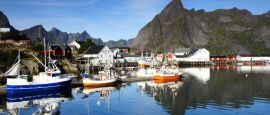Norway History, Language and Culture
History of Norway
From Norse warriors to Vidkun Quisling, Norway’s history boasts enough twists and turns to fill a Viking epic. Early Norse civilisation bore cultural fruit in the shape of Viking epics and the ferocity of Viking warriors is still remembered today. The age of the Vikings came to an end with the advent of Christianity and the death of King Harald Hardrada in the battle of Stamford Bridge in 1066 but their legacy lives on, with the Viking period remaining one of the best-known in Norwegian history.
The years up to 1905 saw Norway lose its sovereignty, first to Denmark and then to Sweden, when it was handed to Stockholm in 1814 by the Danes who were forced to concede it as a result of being on the losing side in the Napoleonic Wars. After much wrangling, Norway finally gained independence in 1905 following a referendum. Its newly won autonomy wasn’t to last and the Germans invaded in 1940, installing a puppet government led by Vidkun Quisling whose name was to become a by-word for treachery. Norway regained its independence as a constitutional monarchy after the Nazis were defeated in 1945.
One of the most divisive issues in contemporary Norwegian politics has been the country's relationship with the rest of Europe. Norwegians are fiercely protective of their independence and concerns about the effect of European Union membership on the country’s major industries have meant that the electorate has consistently voted to remain outside the EU. However, Norway did join the European Free Trade Area (EFTA), which represents most of the European nations, which are not members of the EU.
Further afield, the Norwegians have established a considerable reputation for handling delicate conflict negotiations, particularly in hosting and mediating the negotiations leading up to the 1994 Israeli-Palestinian peace accord – one of the major foreign policy coups of recent times.
Usually a peaceful and stable country, July 2011 saw twin attacks on the government quarter in Oslo and the Labour Party youth summer camp at Utøya Island, resulting in 77 deaths – Norway’s largest loss of life in a single incident since World War 2.
Did you know?
• The sperm whale is the largest predator in Norwegian waters and the brown bear the largest on land.
• In 2015 Norway’s King Harald V became the world’s first reigning monarch to set foot on Antarctica when he visited Queen Maud Land, a Norwegian dependency.
• The Hardangerjøkulen glacier appears as the ice planet Hoth in the film Star Wars Episode V – The Empire Strikes Back.
Norway Culture
According to 2016 figures, just under 78% of Norwegians identify themselves as Christian. 71.5% of Norwegians belong to the Church of Norway – an Evangelical-Lutheran denomination. Another 6% belong to other Christian denominations such as Catholicism. Of the non-Christian religions the largest group are Muslims, followed by Buddhists, Hindus, Sikhs, Baha’i and Jews, all of which account for 3.5% of the population. 16% of Norwegians identify themselves as having no religious affiliation at all.
Language in Norway
Norwegian (Bokmål and Nynorsk)is the official language but Northern Sami, Lule Sami, Kven and Southern Sami are also recognised. English is widely spoken throughout Norway as are Swedish and Danish.
- Beer = Øl (Oel)
- Closed = Stengt
- Danger = Fare
- Do you speak English? = Snakker du Engelsk?
- Doctor = Doktor
- Eight = Åtte (Aatte)
- Eighty = Åtti (Aatti)
- Entrance = Inngang
- Exit = Utgang
- Fifty = Femti
- Five = Fem
- Forty = Førti (Foerti)
- Four = Fire
- Friday = Fredag
- Goodbye = Hadet
- Hello = Hei
- Hotel = Hotell
- How are you? = Hvordan går det? (gaar)
- How much does it cost? = Hvor mye koster det?
- I'm very well = Jeg har det bra / Det går bra (gaar)
- I don't understand = Jeg forstår ikke (Forstaar)
- I feel ill = Jeg føler meg syk (foeler)
- Menu = Meny
- Monday = Mandag
- My name is = Mitt navn er ... / Jeg heter ...
- Nine = Ni
- Ninety = Nitti
- No = Nei
- One = En
- One Hundred = Ett Hundre
- One Thousand = Ett Tusen
- Open = Åpen (Aapen)
- Please = Vær Så Snill (Vaer Saa Snill)
- Restaurant = Restaurant
- Saturday = Lørdag (Loerdag)
- Seven = Syv
- Seventy = Søtti (Soetti) / Sytti
- Six = Seks
- Sixty = Seksti
- Sunday = Søndag (Soendag)
- Ten = Ti
- Thank you = Takk
- Thirty = Tredve / Tretti
- Three = Tre
- Thursday = Torsdag
- Today = I Dag
- Toilets = Toalett
- Tomorrow = I Morgen
- Tuesday = Tirsdag
- Twenty = Tyve / Tjue
- Two = To
- Wednesday = Onsdag
- Where is ? = Hvorer ...?
- Wine = Vin
- Yes = Ja




 You know where
You know where